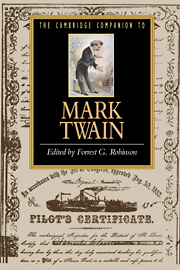Book contents
- Frontmatter
- 1 Mark Twain as an American Icon
- 2 The Innocent at Large
- 3 Mark Twain and Women
- 4 Mark Twain's Civil War
- 5 Banned in Concord
- 6 Black Critics and Mark Twain
- 7 Mr. Clemens and Jim Crow
- 8 Speech Acts and Social Action
- 9 How the Boss Played the Game
- 10 Mark Twain's Travels in the Racial Occult
- 11 Mark Twain's Theology
- Further Reading
- Index
- Continued Series List
9 - How the Boss Played the Game
Twain's Critique of Imperialism in A Connecticut Yankee in King Arthur's Court
Published online by Cambridge University Press: 28 May 2006
- Frontmatter
- 1 Mark Twain as an American Icon
- 2 The Innocent at Large
- 3 Mark Twain and Women
- 4 Mark Twain's Civil War
- 5 Banned in Concord
- 6 Black Critics and Mark Twain
- 7 Mr. Clemens and Jim Crow
- 8 Speech Acts and Social Action
- 9 How the Boss Played the Game
- 10 Mark Twain's Travels in the Racial Occult
- 11 Mark Twain's Theology
- Further Reading
- Index
- Continued Series List
Summary
Shall we bang right ahead in our old-time, loud, pious way, and commit the new century to the game; or shall we sober up and sit down and think it over first? Would it not be prudent to get our Civilization-tools together, and see how much stock is left on hand in the way of Glass Beads and Theology, and Maxim Guns and Hymn Books, and Trade Gin and Torches of Progress and Enlightenment (patent adjustable ones, good to fire villages with, upon occasion), and balance the books, and arrive at the profit and loss, so that we may intelligently decide whether to continue the business or sell out the property and start a new Civilization Scheme on the proceeds?
Mark Twain, "To the Person Sitting in Darkness," North American Review, February 1901Twain is famous for his jeremiads against European imperialism and the fledgling efforts of the United States at colonial expansion in the Philippines. As scholars have pointed out, most of Twain's anticolonial zeal dates from the late 1890s and early 1900s, provoked by such international crises as the Spanish-American War (1898), the Boxer Rebellion in China (1900) , and the Boer War in South Africa (1899-1902). Twain's rage over U.S. annexation of the Philippines in “To the Person Sitting in Darkness” (1901) and “A Defense of General Funston” (1902), the cruel despotism of Belgium's Leopold I in the Congo Free State in “King Leopold's Soliloquy” (1905), and Czar Nicholas II's exploitation of Russians, Poles, and Finns in “The Czar's Soliloquy” (1905) belongs to the historical period in which “imperialism” had entered the popular vocabulary as a term of opprobrium.'
- Type
- Chapter
- Information
- The Cambridge Companion to Mark Twain , pp. 175 - 192Publisher: Cambridge University PressPrint publication year: 1995
- 4
- Cited by



